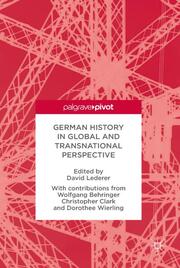Detailansicht
German History in Global and Transnational Perspective
ISBN/EAN: 9781137530622
Umbreit-Nr.: 9044864
Sprache:
Englisch
Umfang: x, 96 S., 1 farbige Illustr., 96 p. 1 illus. in co
Format in cm:
Einband:
gebundenes Buch
Erschienen am 18.08.2017
Auflage: 1/2018
- Zusatztext
- This is a collection of essays from three of the world's pre-eminent historians of Germany, which consider German history in global and transnational contexts. It is well known that transnationalism has exploded in the last decade or so as a new academic subfield of international and global history. What the transnationalism literature often ignores or downplays, however, is the role of the nation-state in making the transnational possible in the first place, as noted in its very etymological origins. This volume traces this dynamic from a different vantage-point, namely the relationship between German history and transnationalism. Each essay applies a transnational framework in fresh and original ways in order to illuminate different facets of the connections between Germany and the wider world in the modern period. Together they will encourage the rethinking of assumptions about key moments and developments in the history of modern Germany, and foster reflection on the evolving nature of German history as a subject studied in the twenty-first century.
- Kurztext
- This is a collection of essays from three of the World's pre-eminent Historians of Germany, which consider German History in global and transnational contexts. It is well known that transnationalism has exploded in the last decade or so as a new academic subfield of international and global history. What the transnationalism literature often ignores or downplays, however, is the role of the nation-state in making the transnational possible in the first place, as noted in its very etymological origins. The proposed volume will trace this dynamic from a different vantage-point, namely the relationship between German history and transnationalism. Each essay applies a transnational framework in fresh and original ways in order to illuminate different facets of the connections between Germany and the wider world in the modern period. Together, they will encourage the rethinking of assumptions about key moments and developments in the history of modern Germany and foster reflection on the evolving nature of German history as a subject studied in the twenty-first century.
- Autorenportrait
- Wolfgang Behringer is Professor of early modern history at the University of the Saarland, Germany. The world's leading historian of witchcraft beliefs, he has written and edited dozens of books on the subject. Christopher Clark is the twenty-second Regius Professor of History at the University of Cambridge, UK. His works include Iron Kingdom: The Rise and Downfall of Prussia, 1600-1947 (2006; winner of the triennial German Historians' Prize); Kaiser Wilhelm II (2000); and The Sleepwalkers: How Europe Went to War in 1914 (2012). David Lederer is Senior Lecturer for early modern European history at Maynooth University, Ireland. His publications include Religion, Madness and the State in Early Modern Europe: A Bavarian Beacon (2006) and a co-edited special edition for the Journal of Social History, 'The Politics of Suicide' (2012). Dorothee Wierling is Emeritus Professor at the University of Hamburg, Germany and Deputy Director of the Hamburg Institute for Contemporary Studies. Her publications include Kaffeewelten (2012), and Eine Familie im Krieg: Leben, Sterben und Schreiben 1914-1918 (2013).
